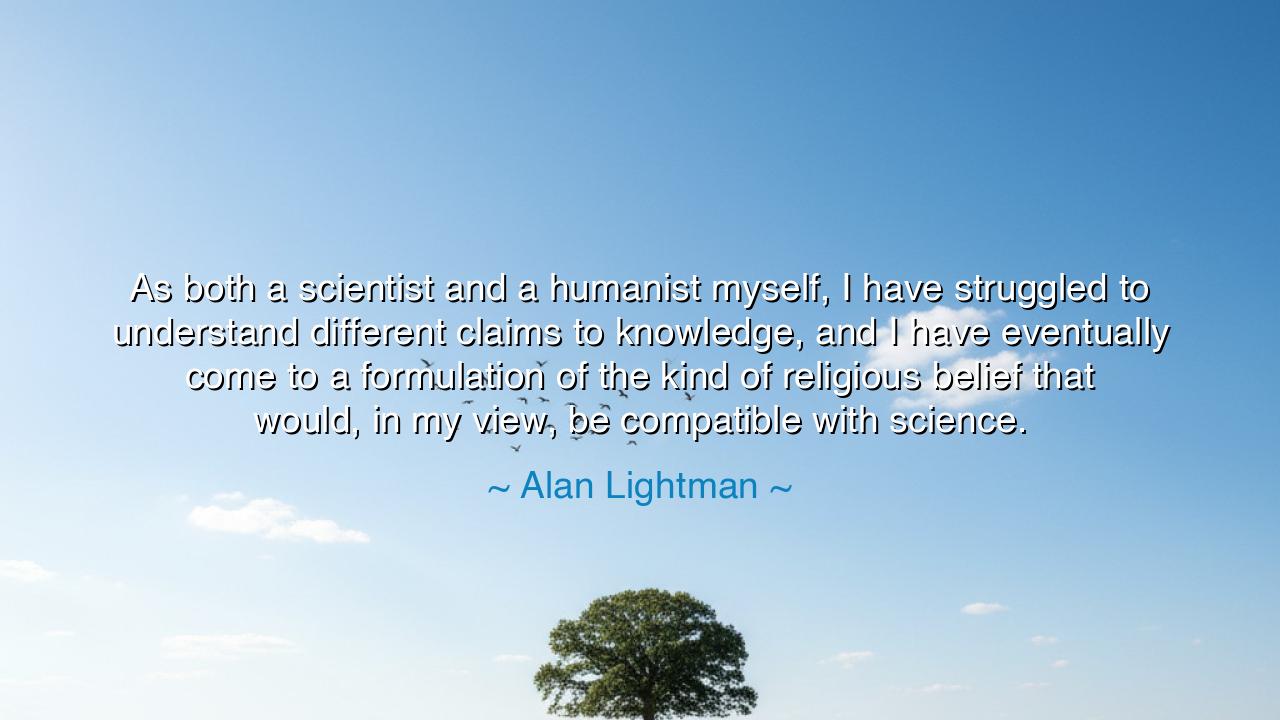
As both a scientist and a humanist myself, I have struggled to
As both a scientist and a humanist myself, I have struggled to understand different claims to knowledge, and I have eventually come to a formulation of the kind of religious belief that would, in my view, be compatible with science.






In this profound reflection, Alan Lightman, both physicist and philosopher, stands at the eternal crossroads between science and faith, two great mountains that have long cast their shadows upon human thought. “As both a scientist and a humanist myself, I have struggled to understand different claims to knowledge, and I have eventually come to a formulation of the kind of religious belief that would, in my view, be compatible with science.” These are not the words of dogma, but of pilgrimage — a journey of the mind and the soul. In them, Lightman speaks for every seeker who has looked up at the stars and asked not only how they burn, but why. His voice is that of a bridge-builder, striving to reconcile the reason of the mind with the longing of the heart.
From the dawn of civilization, humankind has lived in the tension between knowledge and mystery. The scientist gazes into the atom and finds law; the mystic gazes into silence and finds meaning. Yet both look upon the same universe, lit by the same suns and woven of the same invisible fabric. Lightman’s struggle is not new; it echoes the musings of Galileo, who declared that “the Bible teaches how to go to heaven, not how the heavens go.” It recalls the life of Einstein, who, though not bound to religion, spoke reverently of a “cosmic order” that filled him with awe. In this lineage, Lightman stands as a modern voice for the ancient truth that science and spirituality need not be enemies, for both arise from the same sacred curiosity — the desire to know what is real and what is good.
His quote speaks of two kinds of knowledge: one born of observation, the other born of contemplation. The first belongs to the eye, the second to the soul. Science asks, “What is the world made of?” Faith asks, “Why does the world matter?” And when these questions meet, as they did within Lightman’s own heart, a third kind of wisdom arises — one that sees the universe not as a cold mechanism, but as a living symphony, governed by order yet infused with wonder. It is this harmony, not the conflict between faith and reason, that Lightman seeks to describe — a belief compatible with science, where the divine is not above the laws of nature but within them.
To illustrate this union, one might remember the story of Isaac Newton, who, after formulating the laws of gravity, would retire to his study to write theological treatises, seeing in his discoveries the fingerprints of a Creator who loved order and symmetry. Or consider Charles Darwin, who confessed that though he had uncovered the mechanics of evolution, he could not banish the sense of reverence before the beauty of life. In these men, as in Lightman, we see the same eternal truth: that knowledge does not destroy mystery — it deepens it. The more we learn of the universe, the more miraculous it seems that such a universe could exist at all.
The meaning of Lightman’s words lies in his humility before complexity. He does not claim to have resolved the tension between belief and reason; he merely seeks a form of faith that does not deny truth, and a form of truth that does not deny meaning. His journey reflects the highest calling of the human mind — to embrace paradox, to accept that logic and love, formula and faith, can coexist. In a world that often demands allegiance to one side or the other, his voice reminds us that wisdom lies not in division but in synthesis.
And yet, his quote also carries a challenge. It asks: can we, like Lightman, hold wonder and reason in the same heart? Can we look upon the equations of physics and still feel the poetry of existence? For too long, humanity has torn itself between the church and the laboratory, forgetting that both were built by the same restless spirit — the spirit that seeks to understand creation. Lightman teaches that the true enemy of both science and religion is not the other, but arrogance — the refusal to admit mystery where knowledge ends.
The lesson he leaves us is clear: seek truth with humility, and believe with reason. Let science sharpen your intellect, and faith soften your heart. Stand like Lightman — one foot in the realm of atoms, one in the realm of meaning — and do not fear the tension between them. For in that tension lies the essence of what it means to be human: to measure the stars and yet still marvel at their light. The wise do not choose between science and spirit; they walk the bridge between them.
And so, as the ancients once said, “To know is to love.” Let your knowledge lead you not to pride but to reverence. For when science reveals the laws that govern the cosmos, and faith reminds us why the cosmos is worth knowing, then — and only then — does humanity fulfill its noblest purpose: to understand creation without forgetting the Creator, and to see, in every particle and every prayer, the same infinite light.






AAdministratorAdministrator
Welcome, honored guests. Please leave a comment, we will respond soon